#Jefferson Presidency Press
Note
Idk if you still want prompts but a boyf sleepy snuggles prompt is my offering :)
THANK YOU FOR THIS I LOVE SLEEPY CUDDLES SO MUCH I WILL TAKE ANY EXCUSE TO WRITE THEM
Update: ….I went overboard sorry-
“Okay Jere, we’ll just finish this chapter and then we can go to sleep” Michael promised, shrugging the shoulder his boyfriend was resting his head on. Said boyfriend grumbled but nonetheless sat up again, idly scratching at his pyjama shirt. He looked at Michael expectantly, blue eyes clouded with exhaustion.
Michael adjusted his glasses and flipped through the flash cards piled up in his hands. “Okay” he mumbled, selecting one and squinting at it “Who was the first president to live in the White House?”.
Jeremy’s face scrunched up in thought “Uhhh…” he trailed off “Some fucking guy”.
Michael sighed “Jere, baby, love of my life-” he caught his boyfriend before he could flop backwards on the bed “I hate to tell you this but you cant write ‘some fucking guy’ on your history paper”.
Jeremy groaned,covering his face with his arm “Michael it’s ass o’clock in the morning can we please sleep?”.
“As soon as we’re done” Michael promised “Actually, let’s just finish with this question instead” he amended, seeing the exhaustion lining his boyfriend's face.
“Fine” Jeremy conceded “But we do it on the bed so I can sleep right after”.
“Deal” Michael agreed, following his best friend's lead and collapsing onto the pillows of Jeremy’s bed. He could feel sleep pulling at his tired bones but he couldn't succumb just yet - he had a job to finish. Just in case, he set his glasses on the bedside table (he's not making the mistake of sleeping with them on again).
Seeing that his boyfriend was nearly asleep, Michael nudged him. “Jere” he whispered “Just answer the questions and you can sleep”.
Jeremy muttered incoherently into his pillow. Another nudge and he looked up blearily “Wha’s the question ag’n?” he mumbled. Michael laughed “Who was the first president to live in the White House?” he repeated “I’ll give you a hint, he’s mentioned in the Hamilton musical”.
Jeremy squinted at him “...George Washington?”
“After him”
“Thomas Jefferson?”
“Too far ahead”
Michael could practically see the gears turning in his boyfriend's head as Jeremy stared off into space “Oh!” he exclaimed suddenly, eyes going wide “That dude- the- John Adams!”.
“Ding ding ding!” Michael cheered “You got it. We can sleep now”.
“Nice” Jeremy droned, falling back onto his pillow. Michael left the flashcards on the bedside table, rolling over to splay one arm over Jeremy in a familiar position. His boyfriend came closer, pressing his nose to the crook of his neck and sighing softly. He was almost asleep when-
“Michael?”
“Hngh?”
“I can’t sleep.”
Michael was suddenly a lot more awake. He leaned back to make eye contact “Dude what the fuck” he deadpanned.
“I know,” Jeremy sighed.
“You’ve been begging to sleep for like, the past hour”
“I know!” his best friend whined “But now I can’t sleep!”.
Michael let out a deep sigh, letting out his irritation. It wasn't fair for him to be mad at Jeremy for something out of his control. He curled tighter around his boyfriend, absently carding a finger through auburn hair in a practised motion “Anything I can do to help?” he asked quietly.
Jeremy gave a content hum “Keep doing that” he muttered “It feels nice”.
Despite himself, Michael laughed “I know babe, that’s why I do it”. Jeremy didn’t respond, instead burying his face closer. After a few moments, his breathing evened out.
“Jeremy?” Michael whispered “Did you fall asleep?”. He was answered by soft snores. With another quiet laugh, he wrapped his arms around his boyfriend, adjusting into a comfortable position as he drifted off to sleep.
20 notes
·
View notes
Text
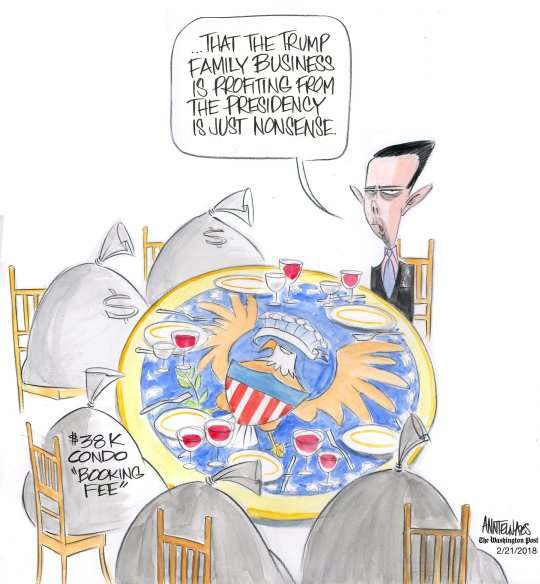
Ann Telnaes :: @AnnTelnaes : "Remember, the Trump company is run by the 2 adult sons who are also involved politically with the GOP and using the presidency for financial gain"
* * * *
LETTERS FROM AN AMERICAN
August 4, 2024
Heather Cox Richardson
Aug 05, 2024
To some fanfare, Vice President Kamala Harris’s campaign today launched Republicans for Harris, which will kick off with events this week in the swing states of Arizona, North Carolina, and Pennsylvania. Their goal, campaign officials told Zeke Miller of the Associated Press, is to make it easier for Republican voters put off by Republican presidential nominee Donald Trump to back Democratic presidential nominee Harris. Curiously, though, in their embrace of the nation’s growing democratic coalition, Republicans crossing the aisle in 2024 are returning to their party’s origins.
The Republican Party itself began as a coalition that came together to stand against an oligarchy whose leaders were explicit about their determination to overthrow democracy. As wealth had accumulated in the hands of a small group of elite southern enslavers, those men had turned against American democracy. “I repudiate, as ridiculously absurd, that much-lauded but nowhere accredited dogma of Mr. Jefferson, that ‘all men are created equal,’” South Carolina senator James Henry Hammond said.
Enslaver George Fitzhugh of Virginia rejected the other key principle of the Declaration of Independence: that everyone has a right to a say in the government under which they live. “We do not agree with the authors of the Declaration of Independence, that governments ‘derive their just powers from the consent of the governed,’” he wrote in 1857. “All governments must originate in force, and be continued by force.” There were 18,000 people in his county and only 1,200 could vote, he said, “[b]ut we twelve hundred…never asked and never intend to ask the consent of the sixteen thousand eight hundred whom we govern.”
Enslavers like Hammond and Fitzhugh believed that some people were better than others and had the right—and the duty—to impose their will on everyone else. If they did not, men like Fitzhugh believed, poor men and marginalized people would insist on being equal, receiving the value of their work and living as they wished.
Under this dangerous system, Fitzhugh wrote, “society is insensibly, and often unconsciously, marching to the utter abandonment of the most essential institutions—religion, family ties, property, and the restraints of justice.” He defended human enslavement as the highest form of society, since paternalistic Christian masters would care for their wards, preventing a world of “No-Government and Free Love.”
The elite enslavers came to control the Democratic Party and, through it, the Senate, the White House, and the Supreme Court. The Whig Party tried for decades to make peace with the increasingly extremist southern Democrats, and as they did so, the party splintered, with those opposed either to human enslavement or the spread of human enslavement to the West—those were actually not the same thing—creating their own upstart parties.
And then, in 1854, with the help of Democratic president Franklin Pierce, elite enslavers managed to push through the Senate a bill to organize the two giant territories of Kansas and Nebraska in such a way that they would be able to spread their system across the American West. The new slave states that would form there would be able to join forces in the House of Representatives with the southern slave states to outvote the northern states that rejected enslavement. Without a brake on their ambitions, the enslavers would be able to spread their worldview across the nation. From their position at the head of the United States, they expected to spread their slave-based economy around the globe.
But their triumph was not to be. With the bill under debate in the Senate, Democrat Amos Tuck of New Hampshire—the state Pierce hailed from—wrote: “Now let Frank Pierce consummate his treason, if he dare. There is a North, thank God!... We have…rebuked treason, condemned the Nebraska Bill, and discarded the President.” Tuck noted that the Democrats were losing “their best men. I think they (the leaders) can never recover from the consequences of having tried to betray their country.” He looked forward to “bringing out in future the true characteristics of our people, so long belied by the most unworthy demagogues….”
Tuck was not alone. The day after the House of Representatives began to debate the Kansas-Nebraska bill, Whig representative Israel Washburn of Maine invited about thirty antislavery representatives to meet at the rooms of his friends, Massachusetts representatives Thomas D. Eliot and Edward Dickinson (whose talented daughter Emily was already writing poetry), in Mrs. Crutchett’s select boardinghouse in Washington, D.C. The men who called the meeting were northern Whigs, and the men who came to it entered the elegant room as members of a variety of political parties, but they all left committed to a new northern organization that would stand against the spread of slavery into the West. They called themselves “Republicans,” hoping to invoke Thomas Jefferson—who had called his own political party Republican—and recall the principles of the Declaration of Independence.
When the House passed the bill on May 22 and Pierce signed it on May 30, the anti-Nebraska movement took off. Conventions across the North called upon all free men to fight together “for the first principles of Republican Government and against the schemes of aristocracy, the most revolting and oppressive with which the earth was ever cursed or man debased.” There were 142 northern seats in the House of Representatives; in the midterm elections that year, voters put “anti-Nebraska” congressmen in 120 of them. Anti-Nebraska coalitions elected 11 senators and swept Democrats out of state legislatures across the North.
In 1855, Pierce insisted that Americans opposing the spread of human enslavement were trying to overturn American traditions, insisting that the United States was a white man’s republic and that the Founders had intended to create a hierarchy of races.
But those coming together to oppose enslavement denounced Pierce’s recasting of American history as “False all through!” As for the Founders, Chicago Tribune editor Joseph Medill wrote, “their ‘one guiding thought,’ as they themselves proclaimed it, was the inalienable right of ALL men to Freedom, as a principle.”
When Democrats tried to call those coming together as Republicans “radicals,” rising politician Abraham Lincoln turned the tables by standing firm on the Declaration of Independence. “[Y]ou say you are conservative—eminently conservative—while we are revolutionary, destructive, or something of the sort,” he said, addressing the Democrats who remained determined to base the United States in enslavement.
“What is conservatism? Is it not adherence to the old and tried, against the new and untried? We stick to, contend for, the identical old policy on the point in controversy which was adopted by ‘our fathers who framed the Government under which we live’; while you with one accord…spit upon that old policy, and insist upon substituting something new…. Not one of all your various plans can show a precedent or an advocate in the century within which our Government originated.”
When voters elected Lincoln president, the fledgling Republican Party turned away from a government that catered to an oligarchy trying to overturn democracy and instead reinvented the American government to create a new, active government that guaranteed to poorer men the right to be treated equally before the law, the right to a say in their government, and access to resources that had previously been monopolized by the wealthy.
The present looks much like that earlier moment when people of all different political backgrounds came together to defend the principles of the United States. In today’s moment, when someone like J.D. Vance backer billionaire Peter Thiel says, “Democracy, whatever that means, is exhausted,” and the Republicans’ Project 2025 calls for replacing democracy with Christian nationalism, it makes sense for all people who care about our history and our democratic heritage to pull together.
Today, Olivia Troye, who served on national security issues in the Trump White House, said, “[W]hat is happening here with the Republican Party… is dangerous and extreme. And I think we need to get back to the values of…observing the rule of law, of standing with our international allies and actually providing true leadership to the world, which is something that Kamala Harris has exhibited during the Biden Administration.”
As Lincoln recalled, when people in his era realized that the very nature of America was under attack, they “rose each fighting, grasping whatever he could first reach—a scythe—a pitchfork—a chopping axe, or a butcher's cleaver. We…are rapidly closing in…. “ And, he said, “When the storm shall be past,” opponents “shall find us still Americans; no less devoted to the continued Union and prosperity of the country than heretofore.”
Indeed, when the storm passed in his day, Americans found that the magnitude of the crisis they had weathered and the rise of entirely new issues meant that old party lines had fallen apart and people reorganized along entirely new ones. Famously, Lincoln’s secretary of war, Edwin Stanton, who in 1860 had worked for the election of extremist Democrat John C. Breckinridge, stood heartbroken by Lincoln’s bedside as he breathed his last and blessed him, saying: “Now he belongs to the ages.”
LETTERS FROM AN AMERICAN
HEATHER COX RICHARDSON
#Ann Telnaes#TFG#political cartoons#grifters#financial gain#corruption#GOP#Republican Party#political#US History#Heather Cox Richardson#Letters From An American#democracy#equality#wealth
11 notes
·
View notes
Text
“France is in the throes of violent birth”: Thomas Jefferson and the 1789 French Revolution
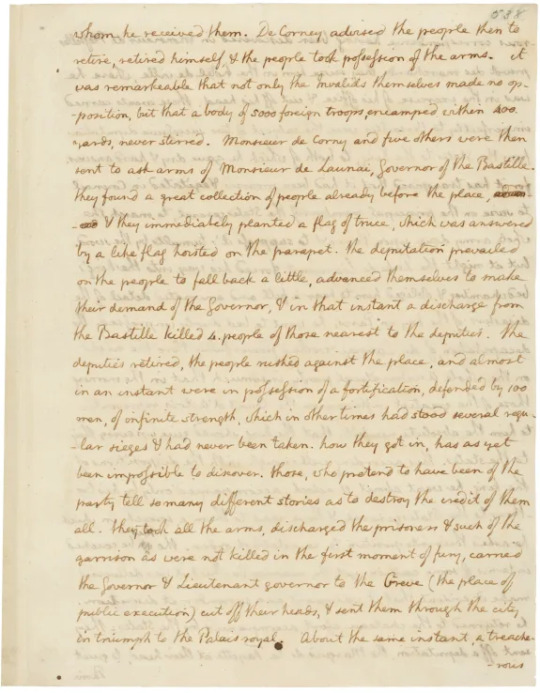
"The deputies retired, the people rushed against the place, and almost in an instant were in possession of a fortification, defended by 100 men, of infinite strength..."
• Ambassador Thomas Jefferson report on the events on 14 July 1789.
The excerpt shown here is from a letter in Jefferson’s own hand to Secretary of Foreign Affairs John Jay. In great depth, he describes the events of July 14, 1789, including the storming of the Bastille in Paris. The Bastille was a symbol of the old regime, and housed arms, gunpowder, and prisoners.
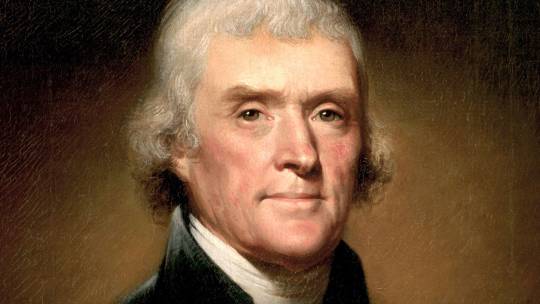
On 14 July 1789, the U.S. Ambassador to France, Thomas Jefferson, was a witness to the events of a day in Paris that is commonly associated with the beginning of the French Revolution. Jefferson recorded the events of the day in a lengthy and detailed letter to John Jay, then Secretary of Foreign Affairs.
The American Revolutionary War began as a conflict between the colonies and England. In time, what began as a civil disturbance turned into a world war drawing France, Spain, and the Netherlands into the hostilities. France would send troops, ships, and treasure to support the American effort. During the war, one of the first priorities of the French government and its allies was to raise funds to fight the war.
When the Treaty of Paris was signed in 1783, France was virtually broke and on the edge of social catastrophe, the result of decades of war with England and other countries. The poor suffered hunger and privation. By 1789, revolution would come to France.

In 1785, Thomas Jefferson arrived in Paris to replace Benjamin Franklin, who was retiring as ambassador to France. At the age of 81, Franklin returned to the United States where he would serve as President of the Pennsylvania Assembly and also participated in the Constitutional Convention of 1787.
John Adams was reassigned to London where he would be the first American ambassador to the Court of St. James. Jefferson remained on duty in France until late 1789 when he returned to the United States. While in France, Jefferson reported on developments at the court of King Louis XVI, the country at large, and the rest of Europe.
Jefferson was sympathetic to the revolution, opening his home in Paris to its leaders and assisting his friend the Marquis de Lafayette with drafting the Declaration of the Rights of Man. As the first Secretary of State under the Constitution and George Washington, his support for France and the revolution continued.
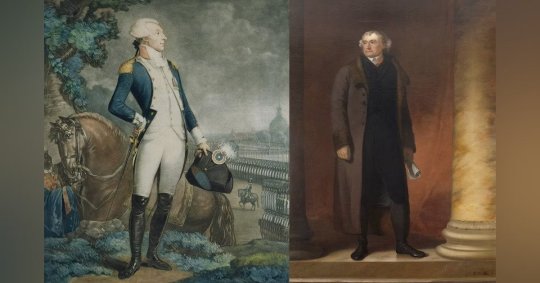
His friendship to the Marquis de Lafayette, who served in the War of Independence and lived almost 10 years in the USA, became very important in the beginning of the French revolution. The Marquis was the General of the french forces 1789 and tried to prevent a civil war and turmoil. He corresponded with Jefferson, who came from a country with the same experiences. Jefferson and the Marquis agreed that France was not mature to become a republic but a constitutional monarchy, like in Great Britain. However, this was the decision of the national assembly, of which the Marquise was a member. Jefferson went daily to Versailles to inform himself about the decisions. During Jefferson’ s visits, they passed the following laws:
1. Freedom of the person by habeas corpus
2. Freedom of conscience
3. Freedom of the press
4. Trial by jury
5. A representative legislature
6. Annual meetings
7. The origination of laws
This totally fit to Jefferson’s principles. In addition, there was passed a bill, which was prepared by Lafayette and Jefferson and which abolish any title or rank to make all men equal.
Thomas Jefferson also helped his friend Lafayette to bring the different opinions in his party about the constitution to an agreement. France should become a constitutional monarchy.
However, after this, Jefferson recognised that he is not allowed to interfere in the French domestic affairs and that he should be neutral and represent his country. He left France in the thinking that the Revolution was over and that France would grow to a constitutional monarchy. Jefferson was proud of the achievements in France and after his return to USA he declared: “ So ask the travelled inhabitant of any nation, In what country on earth would you rather live? - Certainly, in my own where are all my friends, my relations, and the earliest and sweetest affections and recollections of my life. Which would be your second choice? France."
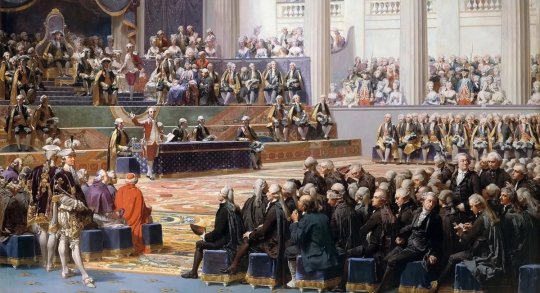
For all his francophile fervour, as the chief American diplomatic representative, Jefferson’s Enlightenment had been a conventionally English one, dominated above all by John Locke. And Jefferson’s first impressions of America’s principal ally in the Revolution were not positive ones. “The nation,” he confided to Abigail Adams in 1787, “is incapable of any serious effort but under the word of command.”
The stars of the French Enlightenment - Voltaire, Diderot, d’Holbach - were frivolous and useful only for manufacturing “puns and bon mots; and I pronounce that a good punster would disarm the whole nation were they ever so seriously disposed to revolt.”
The events of the spring of 1789 soon changed all of that before Jefferson’s very eyes. “The National Assembly,” he excitedly wrote to Tom Paine, “having shewn thro’ every stage of these transactions a coolness, wisdom, and resolution to set fire to the four corners of the kingdom and to perish with it themselves rather to relinquish an iota from their plan of a total change of government” had excited Jefferson’s imagination as nothing before.
Even when the Paris mob seized the Bastille and beheaded the hapless officers of the Bastille, Jefferson shrugged it aside as a mere incident, since “the decapitations” had accelerated the king’s surrender. As Jefferson would write later, “in the struggle which was necessary, many guilty persons fell without the forms of trial, and with them some innocent.” But rather than seeing the French Revolution fail, “I would have seen half the earth desolated. Were there but an Adam and an Eve left in every country and left free, it would be better than as it now is.”

Jefferson’s admiration for the French Revolution seemed to increase in direct proportion to his distance from it. And once he returned to America at the end of 1789, one of his chief motives for taking the post of Secretary of State was to observe and encourage the French eruption, when the National Assembly seized and redistributed the lands of the Catholic Church, when the king foolishly attempted to flee France, only to be captured, placed on trial and executed.
And when a Committee of Public Safety began a national purge - the “reign of terror” - Jefferson continued to describe the French Revolution as part of “the holy cause of freedom,” and sniffed that “the tree of liberty must be refreshed from time to time with the blood of patriots and tyrants. It is its natural manure.”
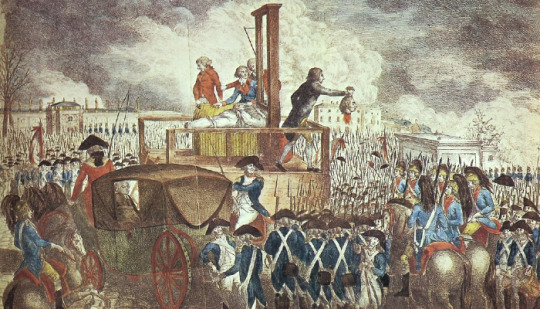
There is no question that Jefferson’s influence in the beginning of the French Revolution was very important. His initial moderate counsels and ideas helped in the beginning to prevent a civil war. His opinion that France was not mature to become a republic is probably right, because after 600 years of monarchy and aristocracy they people were not used to have any rights or take part in political matters. Jefferson thought that a republic had to develop from a constitutional monarchy. When you look to the cruel end of the French Revolution, Jefferson’s assessment was right up to a point.
Jefferson’s time as Secretary of State coincided with the most explosive phase of the French Revolution. What started as an attempt to dismantle the Ancien Régime and institute a constitutional monarchy blossomed into a radical experiment in creating an entirely new republican society. As his correspondence with Minister to France Gouverneur Morris and Minister to the Netherlands William Short during the emergence of the Jacobin Terror reveals, Jefferson responded to the violent radicalisation of the Revolution with enthusiastic support.
His advocacy for the French Revolution did not signify his emergence as a disruptive insurrectionist in favour of purposeless violence, anarchy and unbridled populism. Instead, he advocated for recognition and support of the Jacobin government as a successful international analog to the republican project he wanted to pursue at home at the expense of the “monarchical” aspirations of Hamilton and the Federalists.
In practice, the parallels he imagined between the ideal Jeffersonian and Jacobin republics were usually more apparent than real, as Jefferson often ignored the reports of Morris and Short in favour of fanciful idealising of his French counterparts – a problem Jefferson would only come to grips with in retirement.
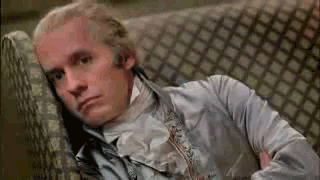
Despite these dilemmas, Jefferson’s impassioned advocacy for the French Revolution proved effective, emerging as a cornerstone of the burgeoning Republican Party’s foreign policy and remaining important well into the early nineteenth century, until the Revolution ceased to be an important political issue. It was not until he became President in 1801 that Jefferson’s views toward France began to cool and became more pragmatic, highlighted by the Louisiana Purchase Treaty.
#thomas jefferson#jefferson#french revolution#14 july 1789#bastille day#america#france#french#monarchy#republic#history#politics#ideology#jacobin#essay#diplomacy#ambassador#jefferson in paris#paris
66 notes
·
View notes
Text
Knights of Liberty - Wikipedia
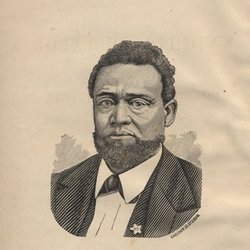
Pictured here is Moses Dickson, from the frontispiece illustration of the 1879 book A Manual of the Knights of Tabor and Daughters of the Tabernacle. In 1872, the Rev. Moses Dickson founded the International Order of Twelve of Knights and Daughters of Tabor, an African-American fraternal order focused on benevolence and financial programs. Dickson was born a free man in Cincinnati in 1824, was a Union soldier during the Civil War, and afterwards became a prominent clergyman in the African Methodist Episcopal Church. Dickson showed an interest in progressive fraternal organizations early on – in 1846 Dickson, with others, founded a society known as the Knights of Liberty, whose objective was to overthrow slavery; the group did not get beyond the organizing stages. Dickson was also involved in Freemasonry – he was the second Grand Master of the Prince Hall Grand Lodge of Missouri.
Dickson’s International Order of Twelve of Knights and Daughters of Tabor – or Order of Twelve, as it’s more commonly know – accepted men and women on equal terms. Men and women met together in higher level groups and in the governance of the organization, although at the local level they met separately – the men in “temples” and the women in “tabernacles” (akin to “lodges” in Freemasonry). The Order of Twelve was most prominent in the South and the lower Midwest. The major benefits to members – similar to many fraternal orders of the time – was a burial policy and weekly cash payments for the sick.
What many people today remember about the Order of Twelve is an institution founded in Mound Bayou, Misssissippi in 1942 – the Taborian Hospital. Michael Premo, a Story Corps facilitator, posted his appreciation for the impact that the Taborian Hospital had on the lives of African-Americans living in the Mississippi Delta from the 1940s-1960s. The Taborian Hospital was on the Mississippi Heritage Trust’s 10 Most Endangered List of 2000, and an update to that list indicates that the hospital still stands vacant and seeks funding for renovation. Here are some photos of the Taborian Hospital today.
Want to learn more about the Order of Twelve? Here are a few primary and secondary sources that we have here in our collection (with primary sources listed first):
Dickson, Moses. A Manual of the Knights of Tabor and Daughters of the Tabernacle, including the Ceremonies of the Order, Constitutions, Installations, Dedications, and Funerals, with Forms, and the Taborian Drill and Tactics. St. Louis, Mo. : G. I. Jones [printer], 1879.
Call number: RARE HS 2259 .T3 D5 1879
—-. Ritual of Taborian Knighthood, including : the Uniform Rank. St. Louis, Mo. : A. R. Fleming & Co., printers, 1889.
Call number: RARE HS 2230 .T3 D5 1889
Beito, David. From Mutual Aid to the Welfare State: Fraternal Societies and Social services, 1890-1967. Chapel Hill, N.C. : University of North Carolina Press, 2000.
Call number: 44 .B423 2000
Skocpol, Theda, Ariane Liazos, Marshall Ganz. What a Mighty Power We Can Be : African American Fraternal Groups and the Struggle for Racial Equality. Princeton : Princeton University Press, 2006.
Call number: 90 .S616 2006 (1)
(1) From The National Heritage Museum - http://nationalheritagemuseum.typepad.com/library_and_archives/2008/05/moses-dickson-a.html
SOME ADDITIONAL INTERESTING INFORMATION ABOUT MOSES DICKSON
Moses Dickson, prior to the Civil War was a traveling barber. Later he became an AME minister and was known as Father Dickson.
He was one of the Founders of the Lincoln Institute, now Lincoln University in Jefferson City, Misouri.
In 1879 along with others such as James Milton Turner, John Wheeler and John Turner he helped create the Committee of Twenty Five, organized to set up temporary housing for the more than 10,000 travelers who passed through St. Louis each year.
He was President of the Refugee Relief Board in St. Louis which helped to shelter and feed 16,000 former slaves who relocated to Kansas.
Moses Dickson was the first Grand Lecturer of the Most Worhipful Prince Hall Grand Lodge of Missouri upon its foundation in 1865. He was the second Grand Master of this Grand Lodge and the Grand Secretary in 1869.
In 1876 Companion Moses dickson was elected Deputy Grand High Priest of the Grand Chapter of Holy Royal Arch Masons of Missouri and Jurisdiction.
Moses Dickson wrote the Ritual of Heroines of Jericho penning the “Master Mason’s Daughter,” the “True Kinsman,” and “Heroines of Jericho” degrees. It was sold and distributed by the Moses Dickson Regalia and Supply Co., Kansas City, Missouri and entered into the Library of Congress, Washington, D.C. in the year 1895.
The Knights of Liberty was organized by 12 Black Men in secret in August, 1846 in St. Louis, Missouri. They were also known as the Knights of Tabor or the International Order of Twelve. Tabor is a Biblical mountain in Israel where the Israelites won a big victory over the Canaanites.
Moses Dickson was a leader of the Underground Railroad. He and 47,000 other Knights enlisted in the Union Army as soon as Linclon authorized Black men to sign up.
Disbanded by the Civil War many of the Knights of Liberty reformed after the War was over into a benevolent fraternal society named the International Order of the Twelve Knights and Daughters of Tabor. Moses Dickson authored “International Order of Twelve 333 of Knights and Daughters of Tabor,” a book outlining the Constitution, Rules and Regulations of the Temples of the Uniform Rank of Tabor and Taborian Division.
Moses Dickson died on November 28, 1901. A truly remarkable man!
Originally published at the National Heritage Museum’s blog. The National Heritage Museum is an American history museum founded and supported by 32° Scottish Rite Freemasons in the Northern Masonic Jurisdiction of the United States of America.

#Moses Dickson and The Knights of Liberty#Moses Dickson#Knights of Liberty#Black Revolutionaries#International Order of Twelve#Twelve Knights and Daughters of Tabor#International Order of Twelve 333#Committee of Twenty Five#St Louis#missouri#freedom#Freedmen#Refugee Relief Board in St. Louis#Ritual of Heroines of Jericho#oes
19 notes
·
View notes
Text
The fascination with busts of Hamilton
After @essentialaegis pointed this out in the notes of this post, I started to look back and realize there were quite a few times people had some alluring interest or comments towards busts of Hamilton. These particular recollections being from Elizabeth Hamilton, Thomas Jefferson, and none other than Aaron Burr.
I remember nothing more distinctly than a sofa and chairs with spindle tracting legs, upholstered in black broadcloth, embroidered in flowery wreaths by Mrs. [Elizabeth] Hamilton herself, and a marble bust of [Alexander] Hamilton standing on its pedestal in a draped corner. That bust I can never forget, for centuries the old lady always paused before it in her tour of the rooms, and, leaning on her cane, gazed and gazed, as if she could never be satisfied.
The Atlantic Monthly. United States, Atlantic Monthly Company, 1896.
After gazing a moment at these objects, the eye settled with a deeper interest on busts of [Thomas] Jefferson and [Alexander] Hamilton, by Ceracchi, placed on massive pedestals on each side of the main entrance—“opposed in death as in life,” as the surviving original sometimes remarked, with a pensive smile, as he observed the notice they attracted.
Randall, Henry Stephens. The Life of Thomas Jefferson. United States, Derby & Jackson, 1858.
Soon after his return Burr visited Boston. Phillips called on him at the Tremont Hotel, and offered to act the part of a cicerone. Among other places they went to the Athenæum, then on Pearl Street, to see the pictures and look at the library. As they walked down the hall, between the alcoves, Phillips caught sight of a bust of Hamilton, one of the ornaments of the library, which he had forgotten was there. He tried on some pretext to draw Burr in another direction; but he, too, had seen the bust and marched straight up to it. He stood facing it for a moment, then turned and said: “A remarkable man—a very remarkable man.” Upon this he wheeled on both heels in military style and moved on again with great composure.
Martyn, William Carlos. Wendell Phillips: the Agitator: With an Appendix Containing Three of the Orator's Masterpieces, Never Before Published in Book Form, Viz.: "The Lost Arts", "Daniel O'Connell", "The Scholar in a Republic".. United Kingdom, Funk & Wagnalls, 1890.
[Original source Recollections of Wendell Phillips, by F. B. Sanborn]
Take an anecdote in point. Mr. John Ant—n, a brother lawyer, had a bust of Hamilton in his office, and, from a trick or habit, A., when in earnest thought or talk, would fix his eye upon the bust. Burr had a consultation with him; and A., unconsciously, fixed his eye upon the pale Hamilton; but, instantly remembering, withdrew his sight from it, still not before Burr divined his thoughts. The Colonel quietly, slowly poked out his long fingers, pointed to the bust very deliberately, and said: “He may thank me—I made him a great man.”
PARTON, James. The Life and Times of Aaron Burr ... Vice-President of the United States, Etc. Fourteenth Edition. United States, n.p, 1864.
He had occasion to pay some attentions to Aaron Burr during a visit Burr made to Boston after the death of Hamilton. He took him to the Athenæum, and while walking through the sculpture gallery, seeing the bust of Hamilton near him, turned off, naturally thinking it would be disagreeable to Burr to be brought before it. But Burr went directly up to it and said in a very loud tone, ‘Ah! Here is Hamilton.’ And, pressing his finger along certain lines of his face said, ‘There was the poetry!’
Adams, Charles Francis. Richard Henry Dana: A Biography. United States, Houghton, Mifflin, 1891.
Arguably the most beloved busts of Hamilton has been coined as Giuseppe Ceracchi's iconic one. When Ceracchi took a trip to the US in 1791-92, he proposed a monument in honor of the Revolution and appealed to Congress to finance the project. Ceracchi had attempted to raise the funds for the memorial, and Jefferson endorsed him and told Robert Livingston that he was; “a very celebrated sculptor from Rome.” [x] He began sculpting models of the founding fathers, including others like Washington and Jefferson. In July 1792, Ceracchi wrote to Hamilton that he was; “impatient to receive the clay that I had the satisfaction of forming from your witty and significant physiognomy”. [x] When Ceracchi heard the memorial proposal was rejected by Congress on May 7th, 1792, he sent the completed busts to each of his models in 1794. Hilariously, he also sent them each a bill for the work which they didn't ask for. Though while Washington tried to return the bust rather than pay that outrageously for a marbel copy of his face, Hamilton shamelessly paid $620; “for this sum through delicacy paid upon cherachi's draft for making my bust on his own importunity & as a favour to him.” [x]
The Roman stylized bust paints Hamilton like an ancient senator, with a slash of the Order of Cincinnatus over his bare chest—Likely referring to the Society of the Cincinnati, which you can read more about here and here. The original is inscribed on the back in Latin; “DE FACIE PHILADELPHIAE EX ECTIPO FLORENCIAE FACIEBAT JOS. CERACCHI CIDDCCLXXXXIV” Which translates; “Executed in Philadelphia and copied in Florence, Executed by Joseph Ceracchi, 1794.” [x]
The Hamilton family kept the bust until 1896 when they donated it to the New York Public Library, there is also a copy on display at the Grange. This bust would be utilized as a common reference for Hamilton's appearance posthumously, as Trumbull used the bust as model for a series of 1804-1808 portraits of Hamilton, that would later be used for reference on the ten dollar bill. [x] And the first US Postal Service stamp to honor Hamilton was an 1870 30-cent stamp using this bust as a model. [x] Also in 1880 while the bust was owned by Hamilton's son, John Church Hamilton, he lended it so it could be used as a model for the head of the granite statue of Hamilton by Carl Conrads. [x]

#amrev#american history#alexander hamilton#historical alexander hamilton#elizabeth hamilton#elizabeth schuyler#thomas jefferson#aaron burr#history#cicero's history lessons#founding fathers
98 notes
·
View notes
Photo

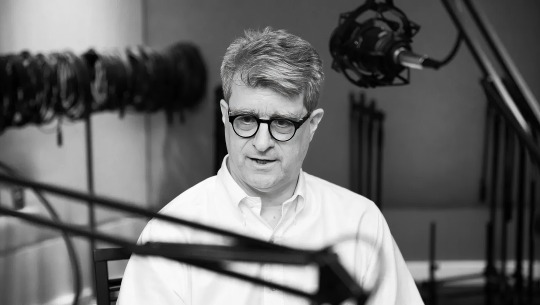


Behold, the king of online cartoons
Ex-Hanna-Barbera whiz Fred Seibert blazing a trail with YouTube network
A couple of times over the years, then-USA Today’s entertainment and tech reporter (and photographer) Jefferson Graham was nice enough to feature me in an article about the cartoons I was producing. First time was in the late 90s with “Oh Yeah! Cartoons,” but in 2015, with streaming video finally reaching the mainstream press (Channel Frederator actually started in 2005) and Graham’s animator son joining our network, he revisited.
Thanks to animator Michael Hilliger, who sent over his copy of the article in 2024.
By Jefferson Graham USA Today July 17, 2015
LOS ANGELES — Fred Seibert wants you to have his card.
And his phone number. He even won't mind if we print his [email protected] e-mail address right here in USA TODAY.
Seibert, 63 is the online toon king, with 400 million views monthly to his Channel Frederator network on YouTube, but he's never sure where his next hit will come from.
So he's always out there looking, at schools, industry gatherings, book signings. You name it.
Next weekend, he'll be at the Vidcon convention near Los Angeles, a gathering of folks who make their living off YouTube, which is where most folks see his online `toons.
"I have no ideas," he says. "But I recognize talent."
That's for sure. Seibert, then president of Hanna-Barbera's cartoon studios in the 1990s, is credited with discovering Seth MacFarlane, the creator of the Family Guy, fresh from college, when he hired him to work on Hanna-Barbera cartoons.
For Seibert's "What a Cartoon!" series for the Cartoon Network, Seibert hit ratings gold, signing up the creators who churned out hits like "The Powerpuff Girls," "Dexter's Laboratory" and "Johnny Bravo." Their series debuted as shorts for first for Seibert's series.
He still serves as executive producer of "The Fairly OddParents," a TV series he began producing in 1998 when it debuted on his "Oh Yeah, Cartoons," series. It's been running ever since on Nickelodeon.
Seibert's biggest audiences, however, have come from online, to the tune of some 1.9 billion views for 'toons like the Bee and PuppyCat and Bravest Warriors.
We had Seibert as a guest on our #TalkingTech podcast in June. At the time, he was averaging 300 million monthly viewers to the Channel Frederator network. Now he's already up to 400 million monthly viewers, and predicts he'll top 700 million by year's end, and 1 billion by 2016.
The reason for the massive growth is that unlike before, when animation was targeted just to young kids, either for Saturday morning TV, and kid-based cartoon TV channels, anyone of all ages can view `toons online.
Seibert's Cartoon Hangover, a Frederator section where he shows the best of his `toons, bills itself as the channel for "cartoons that are too weird, wild, and crazy for television."
“Bee and PuppyCat,” about a young woman with a hybrid dog-cat, is written by Natasha Allegri, a woman in her 20s, about a character in her 20s, and thus, obviously not targeted to the traditional animation crowd.
"No matter what your interest online — whether it be anime, or science fiction or comedy cartoons, there is a place for you," Seibert says. "TV has a tough time supporting the sub-genres. Online is all about sub-genre."
Channel Frederator is what's known as a multi-channel network. Cartoons run on YouTube, but his network promotes them, sells ads and distributes the proceeds to some 2,000 of his video makers.
Through Frederator, the channel makers learn about which color to make their thumbnails to find larger YouTube audiences (he recommends yellow) and which keywords to use in the descriptions ("funny" always works, he says.)
"We give them the tools to grow their performance," he says.
Dominic Panganiban, a 24-year-old animator from Toronto, joined the Frederator network in November, and has seen his subscriber base grow ten times since.
He had been working with Full Screen, another multi-channel network that works with YouTube creators to help them monetize their videos and attract larger audiences.
"Frederator was a better fit, because they cater more towards animation channels," Panganiban says. Because Frederator attracts folks who enjoy cartoons, "I have more potential here."
By being part of the Frederator network, Australian animator Sam Green says he's learned about how to better promote his cartoons, and gotten access to a database of free music and sound effects to use in his cartoons.
He too has seen a spike in traffic.
Being with Seibert "helped me move from my mother's garage to affording my own apartment in the big city," he says.
How did the traffic for both creators go up so dramatically?
Seibert promoted the cartoons to his audience. With 2,000 cartoon makers, that's a lot to choose from. He says he'll plug as many of them as "show an interest" to growing their audience. He looks for people who post new work regularly, stay in touch, and ask "what we can do to help them more."
And despite the massive online audience, Seibert isn't making money yet, and doesn't think he will for another three years.
"Our cartoons are 3-4 minutes long, and the average American watches 6 hours of TV a day," he says. "We have a long way to go to even that out."
Photography by Jefferson Graham, July 2015
9 notes
·
View notes
Note
by washington never having kids of his own, were there ever rumors about him not sleeping with martha basically? because i know that at that time it'd me more easy for them to put the blame on Martha, but nevertheless, people could try to turn to this around to hurt his image saying he was a sodomite and everything (specially during the amrev)
and if they did, did it ever had any bad consequences to gwash?
Yes, actually. Many.
Although Washington was generally revered by many people, he had many political enemies, especially among the British, as you may imagine. During the Revolutionary War, British newspapers constantly insulted the Washingtons and made up wild rumors about them. Some of these were symbolic more than anything, not meant for anyone to take word for word, but others were used to attempt to persuade Americans against their beloved commander.
Blame was put on Martha, but they had virtually no information on her, so they had far more ammunition against Washington himself. And most of these accusations involved sodomy, if not stupidity and other forms of incompetence. The Journal of the American Revolution has compiled a list of Washington's alleged affairs. There is no proof, at least not that I have seen, to substantiate any of these.
The criticisms Washington received from the press later in his career don't seem to be as scandalous. After reading Mount Vernon's article on the press attacks against Washington during his presidency, it seems they were mostly civil. However, Jefferson did play a major role in this, and he famously called Adams a hermaphrodite, with both the physical traits of man and woman but the qualities of neither, so I won't make any claim that they were entirely PG.
However, these didn't really seem to have any kind of effect on Washington's overall reputation. This was most likely due to the fact that he never responded to these accusations publicly (unlike someone we know). He was known to be very self conscious about what the general populace thought of him, but he never let that show. He was very strict about his etiquette rules, and I think responding would go against most if not all of them. This basically swept most of the allegations under the rug, and implied that all of them, even if they had some truth, were false.
These blasphemous allegations appear in many different forms of media about Washington. For example, in the first episode of Turn: Washington's Spies, the fight in Strong Tavern is started by a newspaper referencing this kind of publishing, which is one of my favorite details because it did happen, and the crude humor is pretty historically accurate. Thanks for the ask!!
#george washington#amrev#american revolution#revolutionary war#history#american history#martha washington#washington administration#asks
51 notes
·
View notes
Text
burr pt.2 electric boogaloo (this joke is only funny to me)
its politics time, because Burr had a really fucking long political career and i get tired just reading about it. (also here's pt. 1)
Washington and Adams Administrations
Burr said he found politics "a great deal of fun" so he entered the 1792 gubernatorial race in NY, but withdrew bc Daddy Clinton told him to. He was supported by Northern republicans, but was distrusted by Southerners (wonder why). According to James Monroe, my detested, it was better to select "a person of more advanced life and longer standing in publick trust, particularly one who in consequence of such service had given unequivocal proofs of what his principles really were." Now, you may be thinking that he must be talking about Jefferson, but this is Monroe, and he was probably just kissing his own ass, as per usual.
Burr sided with anti-administration forces who opposed Hamilton's financial plan and Washington's foreign policy. Burr also defended Albert Gallatin who was unseated in 1794 after Federalists determined he did not meet the 9 year citizenship requirement.
Burr voted against Washington's nomination of John Jay as envoy to Britain in 1794, and was one of the most outspoken opponents of the Jay treaty.
Burr set his sights on the presidency with an energetic campaign in the 1796 election, and Republicans endorsed him as their second choice (ie vice-president canidate), but it was still a little divisive. Most, if not all, Democratic-Republicans voted for Thomas Jefferson, and only half of his voters also voted for Burr. Burr finished fourth with 30 electoral votes.
Burr retired from the Senate in 1797, and returned to the New York Assembly in 1798, making several enemies during his brief term. As relations with France got heated over the XYZ affair, Burr advocated for defensive measures to protect New York harbor. This was reasonable since New York was very strategically important, but it's location made it vulnerable to a naval attack. This prompted accusations that Burr had switched parties to the Federalist side, and that he abused public trust for personal benefit, a common theme in rumors about him. Allegedly, he participated in private land speculation ventures in NY and sought to enact legislation removing restrictions on land ownership by non-citizens, which would increase the value of western lands. Basically, they thought he was trying to influence legislation so he could make money.
Hammy boy is back and this time he is working together with Burr. Burr and Hamilton secured a charter and raised subscriptions for a private company to improve the water supply of Manhattan. These were two incredibly intelligent and creative men, and that is greatly reflected in their choice for the company's name, The Manhattan Water Company (/sarcasm). Turns out, the extra money from this was used to establish the Bank of Manhattan, which was controlled by Republicans. Pretend to be shocked even though both of them lived on Wall Street.
Some weird shit went down with the Republican voters in New York in the 1799 election, and Burr was turned out of office. People were really suspicious of him, but he remained a vital asset.
Burr opposed the Alien and Sedition Acts, which won him Demo-Republican support, especially in New York which had a large immigrant population. This ensured that NYC elected a Republican delegation to the state legislature in 1800.
Election of 1800
Republicans wanted a New Yorker for their 2nd presidential choice (im saying this instead of vice presidential candidate and you'll see why). Clinton refused, so Burr was the next option. He was nominated on May 11, 1800. Jefferson claimed he harbored reservations of Burr, but he was acting all nice to him to ensure Republican victory. Jefferson was also very busy with his behind-the-scenes campaign, writing letters and encouraging press support that was critical of the Adams Administration. This is when he called him a hermaphrodite btw.
Burr had a far more active campaign technique. He visited Rhode Island and Connecticut in late August to secure Republican support. Burr's political prowess during 1800 raised suspicion among enemies and supporters. He didn't fit the stoic, unattached statesman who just let his supporters run the campaign for him. Burr campaigned more like a modern politician.
It was generally expected that each elector would cast one vote for Jefferson, one for Burr. Each elector had two votes, and they didn't distinguish who they wanted for president, and who they wanted for vice president. Whoever came in second would be VP, so the party would generally determine who they would advocate the most, and who they would advocate the second most. Basically they were like "this guy is great! this guy is also pretty good. also we HATE those guys (other party's nominees)" So, they really just hoped that Jefferson would get the most, and Burr would get second.
...but, uh, by mid-December, Republicans still didn't have a president in office. They definitely defeated the Federalists, because Adams and Jay had like. no votes. But Jefferson and Burr both had 73 votes, and were at a stalemate, which meant that the vote would be taken to the House of Representatives.
Federalists JUMPED on this opportunity, specifically Hamilton, who had already doomed Adams to lose the election. Some Federalists believed that Burr was more flexible and less partisan, and would be more likely to approve Federalist legislation. Other Federalists who supported Burr hoped that if the two parties were deadlocked for too long, Federalist-leaning Congress would resolve the impasse with legislation authorizing the Senate to elect a Federalist president. This is stupid and idk why people thought this was possible.
Hamilton launched into his smear campaign of Burr. He advised other Federalists not to trust Burr in very simple words, but in the background he was spreading awful rumors about Burr, which was pretty usual. The only difference from how he attacked Burr vs how he attacked Adams is that he didn't publish anything about Burr, but he would have.
The House of Representatives announced Jefferson was the winner on February 17, 1801. Burr made only a few comments and they were guarded, evasive, and contradictory. He seemed particularly angry that there were rumors that he was soliciting Federalist support in an attempt to steal the presidency, which he didn't do, but he happily accepted any Federalist votes.
"...take no step whatsoever, by which the choice of the House of Representatives can be impeded or embarrassed, [instead] keep the game perfectly in Your own hand." -advice from Federalist Robert Goodloe Harber against withdrawing from the election that Burr followed
Jefferson Administration
Burr was inaugurated as VP on March 4, 1804 by James Hillhouse in the Senate Chamber of the new capitol. He gave a brief address of "about 3 sentences" which was overshadowed by Jefferson's speech.
He immediately received a shit ton of letters from associates seeking appointments and demanding removal of Federalists. He handed these off to Jefferson, who removed the "midnight appointments" from the Adams Administration.
In fall of 1801, Burr campaigned for a naval position for Matthew L. Davis, and it was around this time that Jefferson began to distance himself from Burr. Davis' appointment was reliant on Clinton and De Witt for a NY appointment. De Witt talked mad shit about Burr, and Burr was so upset that he talked in the third person about it (he did this a lot).
"The handbills were numerous, of various descriptions, uniform however in Virulent and indecent abuse. [T]o Vilify A.B. was deemed of so much consequence that packages of them were sent to various parts of the country." -Burr
Burr lost like. all political relevance except for being VP. I mean, people still respected him because he wasn't bad at his job, but they were incredibly suspicious of his Federalist friendships, alienation from Republicans, and his now infamous opportunism.
On January 27, 1802. Burr cast a tie-breaking vote that undercut Republican effort to repeal the Judiciary Act of 1801, which provided reforms to the Supreme Court which allowed for a potentially Federalist controlled judiciary (shout out John Marshall). Burr voted for Republican repeal, and secretly informed Federalists he would add amendments to make it acceptable to moderate Republicans. He resolved the tie in favor of Federalists.
"I am for the affirmative, because I can never resist the reference of a measure where the Senate is so nicely balanced, when the object is to effect amendment, that may accommodate it to the opinions of a larger majority; & particularly when I can believe that gentlemen are sincere in wishing a reference for this purpose. Should it, however, at any time appear that delay only is intended, my conduct will be different." -Burr (apparently in 2020 I didn't think it was important to have dates for my quotes.)
After Burr announced a select committee consisting of 2 Republicans, 2 Federalists, and 1 moderate, The New York Evening Post wrote, "The Vice President was very deliberate. He took ballots of the respective Senators, examined them attentively, state the number of them, & holding them up in his hand, mentioned that gentlemen, if they chose, might come and examine them. Mr. G[ouverneur] Morris hoped never to see, in the Senate, a proceeding implying so much distrust." And i'd love to tell you what political party the Evening Post was associated with, but I didn't know how to take notes in 2020, and I'm losing my mind just a little.
Burr continued to be estranged from his own party, possibly to form his own, but no one really liked him so, tough luck. Burr contacted Jefferson, saying that he thought it was best for him to retire for the sake of the party, and wanted Jefferson to publicly give him his confidence. Jefferson said he had no influence in the last election, but he would in the next, which is weird and foreboding but aight. Jefferson didn't trust Burr because he was pissy that Burr warned Madison not to trust people (ie Jefferson) too much.
Burr retired without Jefferson's "mark of favor", and was replaced as VP by Clinton. After leaving the vice-presidency, he entered the NY gubernatorial race to have some kind of a job, since he was majorly in debt.
*wipes sweat dramatically* okay so i think i'll have 1-2 more Burr posts, and then we're onto Lafayette, which is going to be significantly more extensive because I've read two full books about him, and taken notes on him. and THEN i have to do Hamilton which will be. even more extensive. but we got this. okay bye see you in the next one
#aaron burr#history#amrev#alexander hamilton#american history#amrev history#thomas jefferson#founding fathers#election of 1800#do it for richie 💪
20 notes
·
View notes
Text
The Cheshire Mammoth Cheese was a gift from the town of Cheshire, Massachusetts to President Thomas Jefferson in 1802. The 1,235-pound (560 kg) cheese was created by combining the milk from every cow in the town, and made in a makeshift cheese press to handle the cheese's size. The cheese bore the Jeffersonian motto "Rebellion to tyrants is obedience to God."
...
The cheese remained at the White House for over two years, having been featured in a public dinner for an Independence Day celebration in 1803, eventually being replaced by the "Mammoth Loaf," a large loaf of bread made by the United States Navy out of a barrel full of flour.
got a great idea for the next white house christmas decor theme
2 notes
·
View notes
Note
I'm hearing people say that Grant was an atheist or agnostic. Is this true?
Grant wasn't explicitly agnostic or atheistic, but along with Millard Fillmore and Andrew Johnson, he was one of the least outwardly religious Presidents prior to the 20th Century (the first five Presidents -- Washington, John Adams, Jefferson, Madison, and Monroe -- were also relatively quiet about their faith in public, but that can be attributed more to the fact that they were all extremely sensitive about the separation of church and state than an absence of strong core religious beliefs).
When it comes to the faith of General Grant specifically, I'll quote William A. DeGregorio's helpful description about that aspect of his life:
"As a youth Grant rarely went to church and had never been baptized. He began attending Methodist services irregularly with his wife. During Grant's final struggle with cancer, the Reverend John Phillip Newman of the Metropolitan Methodist Church of Washington, D.C., called on Grant regularly, urging him to confirm his faith in God and the church. After one such visit, Reverend Newman announced to the press that he had baptized the former President at his request. Family members later disputed this, however, saying that Grant had tolerated Newman's visits and bedside prayers only because they comforted Mrs. Grant and he did not wish to be rude to the minister. Indeed, Grant had little use for organized religion. However, he many times expressed belief in God, the Bible, and an afterlife."
#History#Presidents#Ulysses S. Grant#Religion and the Presidents#Presidential Religion#Faith and the Presidents#Religion#President Grant#General Grant#Presidential Religious Beliefs
16 notes
·
View notes
Text

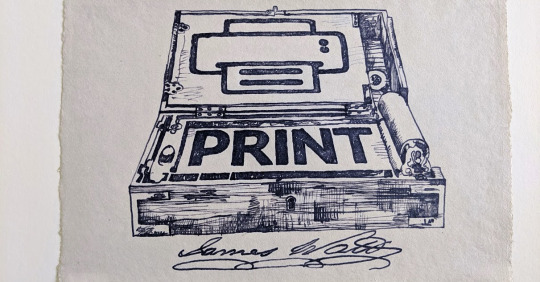
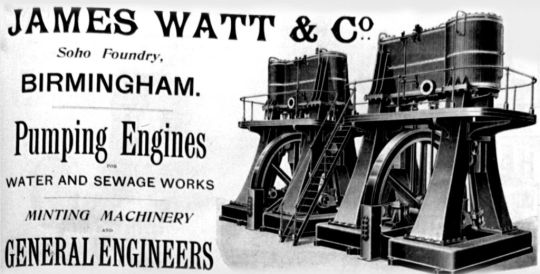
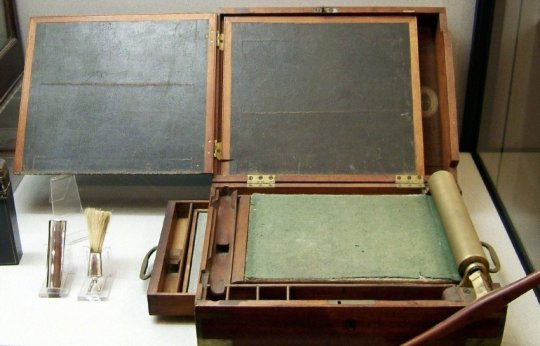
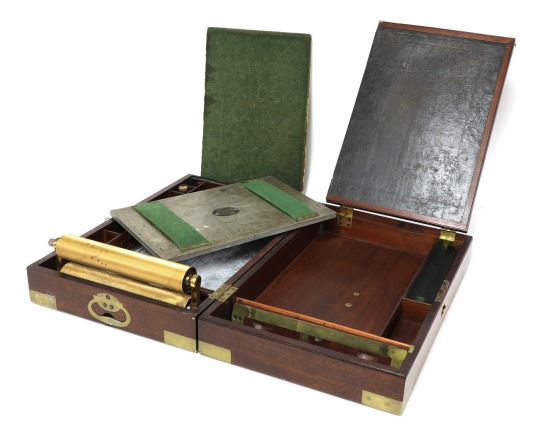
March 20th 1780 the firm of James Watt and Co was established to manufacture the world’s first duplicating machines.
Most people only associate Watt with the advances he made in engineering, mainly the steam engine, but he invented this to relieve him of the tedium of making copies of his plans and drawings. The press copies a written document by pressure onto thin, translucent, unsized paper, producing a reversed copy from the back. Watt patented the device in 1780 and his company continued to produce it long after his death. The principle on which the machine is based remained in use until the arrival of modern photocopiers.
By the end of the year he had sold over 150 of the machines,
Some of the world’s most famous people owned these machines, and I mean worldwide, not just in the British Isles, one such man was a Founding Father and third president of the United States, Thomas Jefferson who owned several of the machines and is said to have used it daily for two decades, advocating that every diplomat should have one. The machine provided the foundational material for his archives – the first to exist of any American Statesman.
It was also championed by Benjamin Franklin, who together with Watt and Boulton and formed members of the Lunar Society and were acquainted with leading men of Science throughout Europe and America. This demonstrates how it is itself a significant document of the Industrial Revolution.
The machine itself was ingenious in its simplicity. The letter to be copied was written in a special gelatinous ink and then placed over a piece of tissue paper. Pressure from the roller impressed upon the tissue paper a mirrored replica of the letter, which could then be reversed and read from the opposite side.
Examples of these early models are now housed in the Science Museum in London, but the machine were sold for years, long after Watt passed away in 1819 so there are quite a few out there, I found a few for sale at fine auctioneers and antique dealers, the cheapest I found was just under a thousand pounds.
9 notes
·
View notes
Text
Supreme Court Bracket
Remember that this is a silly Tumblr poll, and these two things are not actually in conflict. So don't get too heated in the notes.


Judicial Review. The case Marbury v. Madison declared a provision of the Judiciary Act of 1789 unconstitutional, thus preventing several late-term appointments by outgoing President John Adams from being seated under incoming President Thomas Jefferson. More importantly, the ruling established the principle of judicial review by which the Supreme Court can overturn, on the basis of unconstitutionality, laws passed by Congress and signed into law by the President. For this reason it is considered the single most important decision in American constitutional law.
Pre-Publication Censorship is Unconstitutional. The case Near v. Minnesota is a landmark United States Supreme Court decision that found that prior restraints on publication violate freedom of the press as protected under the First Amendment to the United States Constitution, a principle that was applied to free speech generally in subsequent jurisprudence. The Court ruled that a Minnesota law that targeted publishers of ''malicious'' or ''scandalous'' newspapers violated the First Amendment to the United States Constitution.
#xkcd#polls#tumblr polls#polls on tumblr#poll tournament#supreme court#law#us law#us politics#american politics#Supreme Court Round 3#Marbury v. Madison#Near v. Minnesota#Judicial Review#Pre-Publication Censorship is Unconstitutional#0x0v0x7
6 notes
·
View notes
Text
Authorities have released civil rights attorney Jill Collen Jefferson from jail in Holmes County after Lexington Police arrested her on Saturday, June 10, while she was filming a traffic stop she saw after leaving an event. Police arrested the JULIAN president nine days after she complained about the department’s treatment of Black residents while meeting with U.S. Justice Department officials.
Jefferson’s attorney, Michael Carr, who said he “is very concerned (Lexington Police) engaged in a false arrest in this case,” informed the Mississippi Free Press this morning that she was being released. Bail bondsman Bonita Streeter also confirmed the release, saying officials had waived fees for the civil rights attorney’s release.
Jefferson, who is from Jones County, founded JULIAN in 2020. She named the organization, which conducts investigations into possible civil rights violations, after her mentor, longtime civil rights leader Julian Bond.
The arrest sparked a backlash from the community over the weekend.
“The citizens of Lexington are fearful of driving for fear of harassment from the police,” the Mississippi Freedom Democratic Party said in a statement this morning condemning Collen’s arrest. “Innocent mentally ill citizens are brutalized on our streets and imprisoned unlawfully. Our elected officials have refused to act on this matter because these unlawful arrests are benefitting the city financially.”
‘I Guess She Thought That Was A Good Idea’
Assistant U.S. Attorney General Kristen Clarke, who is with the U.S. Justice Department’s Civil Rights Division, visited Lexington on June 1 along with U.S. Attorney Darren J. LaMarca of the Southern District of Mississippi.
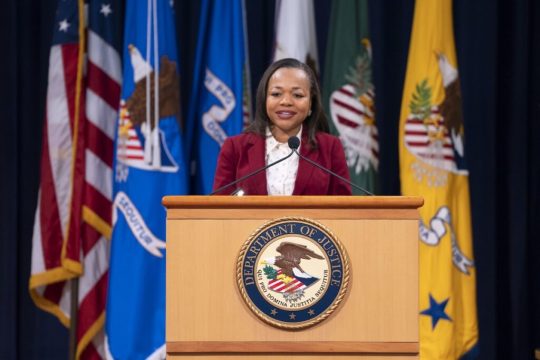
The Mississippi Freedom Democratic Party said its members “were feeling hopeful” after Clarke and LaMarca’s visit—until Jill Collen Jefferson’s arrest.
“Upon leaving an event, she witnessed police officers engaging with a citizen, but because of the numerous complaints against the police department, she decided to drive by the scene and record,” MFDP said. “While driving, an officer asked her to show her driver’s license Other officers approached the vehicle and began to pull her out. She was placed in handcuffs and put in the patrol car.”
Attorney Carr said police charged Jefferson with three misdemeanors, including failure to comply, disorderly conduct and resisting arrest. But he told the Mississippi Free Press this morning that the police department had offered no “narrative supplement” to explain why they charged her with those offenses.
After this story first published, though, Carr shared a recording with the Mississippi Free Press that his office obtained that he says includes remarks the arresting officer made about Jefferson. This reporter could not verify the identity of the person speaking in the recording, however.
“I told her to give me her license five, six, seven, eight times,” a man can be heard saying on the recording. “She argued she ain’t got to. … She was riding by filming. I guess she thought that was a good idea.”
The Mississippi Free Press reached out to the Lexington Police Department for comment this morning, but an employee said there was “no one here right now to speak about that matter” and to call back later. Reached again this afternoon following this story’s initial publication, the department again said no one was available to speak.
Jefferson Speaks: ‘I Did Not Resist’
Later this afternoon, attorney Carr sent this reporter a video of Jill Jefferson speaking with members of the media in Lexington, where she accused the local police of “terrorizing Black people here.”
She said she was driving around with a passenger when she saw the police had someone pulled over and decided to film the incident. The passenger, she said, got out of the car, fearing the police would pull Jefferson over for filming them.
“As soon as the cops saw me, Officer Scott Walters started flagging me down with his flashlight,” Jefferson told reporters. “I stopped, I let my window down, and he said, ‘Show me your ID.’ I said, ‘Why do you need to see my ID?’ … And then he pulled out his taser. And I said, ‘You’re going to tase me?’ And that point, I called my attorney. He said, ‘Jill, of course this is not right, but just show them your ID so you can get this over with.'”
Jefferson said she followed her lawyer’s suggestion, but the situation only escalated from there.
“I held up my license. At that point, Officer Walters snatched my phone out of my hand, he slammed it on the top of the car,” she said. “He started trying to yank at my door handle, trying to pull it open. My car door was locked. He reached through the window and unlocked my car door through the inside. He pulled the door open, pulled me out of the car, pushed me against the car, and then proceeded to arrest me—cuff me. He put my hands behind my back. I did not resist.”
Jefferson said that, after the officer put her in the back of a police car, Jefferson said another officer joined Walters searching her car.
“Then they went to the driver’s side and Officer Walters knelt down and put his hand under the seat and he said, ‘Oh, looky here.’ He’d found my firearm,” she said. “And he said, ‘I sure hope it’s stolen.’ At that point, he came back to the police car. I told him the search was illegal. He told me he would never hire me. He told me I was a shit lawyer since I didn’t know about search incident to arrest. He told me I was being arrested for failure to comply. I told him I had not done anything wrong. He said nothing and shut the car door. He took me to the police station.”
‘It’s Actually Beyond A Breaking Point’

A month later, JULIAN filed a lawsuit against the Lexington Police Department, alleging that it “operates within a culture of corruption and lawlessness, daily and habitually subjecting Black citizens to harassment and brutality, in violation of their civil rights.”
“We are just asking the court to restrain them from targeting, harassing, assaulting Black citizens and violating their constitutional rights in other ways,” Jill Collen Jefferson told the Mississippi Free Press last year. “It’s at a breaking point—it’s actually beyond a breaking point.”
Carr said Jefferson’s court date is set for July 13 at the Lexington Municipal Court.
Lexington is 86% Black and 13% white, but has a deeply racist past. At the dedication of a Confederate monument there in 1908, Confederate veteran Wiley N. Nash said that “these Confederate monuments, these sacred memorials, tells in silent but potent language, that the white people of the South shall rule and govern the Southern states forever.”
The monument still stands at the center of Lexington’s town square.
This story has been updated to add comments from Jefferson after her release.
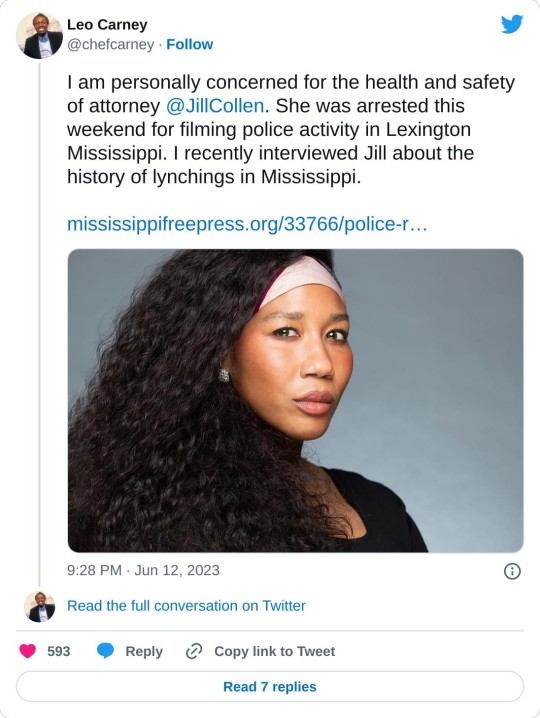
#Jill Jefferson#Jill Collen Jefferson#Mississippi#white supremacy#white cops#racism#white people in the south#Lexington Releases Civil Rights Lawyer Arrested Filming Officers#white hate#confederate monuments
6 notes
·
View notes
Text
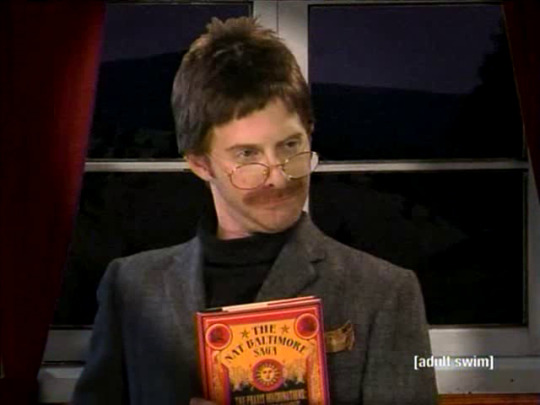
The Young Person’s Guide to History: “The Duel” | April 1, 2008 - 1:00AM | S00E01
The Young Person’s Guide to History was a spin-off of Saul of the Mole Men. Why there should be a spin-off of Saul of the Mole Men is beyond me. Originally the idea was that it was going to be four 11-minute episodes, and in fact it was produced in that format. This is one of those four episodes. When the series turned up later in 2008, they cut the length in half to TWO 11-minute episodes, each episode consisting of what was originally meant to be two episodes, edited down to half the running time. Saul of the Mole Men always came off as over-long, and when I criticized them I usually observed that they could be cut down drastically. I guess when those versions debut, we’ll actually have something to base that theory on (spoilers; I remember it still being bad).
Okay, so this is the intended series finale of the original four-episode run. At least, one would assume that it is. The plot: it’s 1804 and a bunch of guys are called to a haunted mansion to stay the night. There’s a disembodied voice on a little desktop speaker, like the kind you’d page a secretary with in the later half of the 20th Century. That’s a running thing in the series: very casual use of anachronisms. It’s not super-jokey Mel Brooks style, more like “kids making a movie and not having the resources to replicate the past accurately so they just use a car instead of a carriage” kind of thing. I like that. It’s one of the few things I truly like about this.
Okay, haunted mansion with guys. They all get killed except Thomas Jefferson who runs out in anguish, as though he were a man possessed while committing this brutal bout of deadly violence. It turns out the house in question is the White House, and Jefferson is now the president. He asks Benjamin Franklin to help him make a vice president, so they create Aaron Burr in a boiling vat, using “science”. Aaron Burr is, uh, neurodivergent. We see a single scene of him doing vice president stuff: being asked about universal healthcare on the senate floor. He makes an imbecilic re-re noise and pees into his own open mouth. The floor cheers.
Later, while having pizza, Jefferson gets fed up with Burr’s buffoonery and shoots him. He then puts the gun in Burr’s dead hand and uses it to shoot Alexander Hamilton, in order to frame them for each other’s death in a supposed duel, a historical event burned into the minds of a certain generation whose “Got Milk” advertisement got a nation of history buffs rolling in the aisles. Jefferson has transformed into a tyrant, like a guy in a freaking rated-R movie.
Jefferson finally shoots Ben Franklin, but not before cruelly taunting him for his legendary weakness. The voice on the little speaker congratulates Jefferson for being so mean. The voice is in the middle of calling him “Caleb Hilttrop?” or something like that? before being cut off. The significance of this completely eludes me, and I’m not sure if this is set-up in one of the other three episodes that would have aired along with this one, or if I just missed something in the opening sequence. We may never know, because I recall this bit being completely cut out of the version that did air. Jefferson switches the speaker to some rock song and screams “I’m the president!”
I do like that ending, I just wish anything that came before it was compelling enough to call it “earned”. I’d be hard-pressed to come up with much else in this episode that makes it worth watching. This is one of the unfunniest things to air on Adult Swim. It’s barely connected to Saul of the Mole Men, which isn’t a bad thing, honestly.
There is a scene where Seth Green (who is cut from the shortened version entirely) talks about how he and Jefferson co-authored several sci-fi books about Nathaniel Baltimore’s adventures fighting various sci-fi beasts, and we see a little scene featuring Nathaniel Baltimore shooting a creature that is just them reusing the doctor costume from Saul. This seems to imply that either Saul of the Mole Men is a work of fiction featuring Nathaniel Baltimore in this world, which would explain why there’s no real continuity between this show and Saul. I believe the Jefferson episode of Saul has events in it that would contradict the existence of this series, but I”m not feeling curious enough to even re-read my own write-up to confirm this. I will link to it though, in case you are a sicko who actually is curious.
Later in the year the truncated version of the show would air. The full-length versions were put up on Adult Swim for a short period of time. The one guy I knew of who knew how to rip from Adult Swim actually had these at one point, but deleted them because he “didn’t think anyone would want them”. Fucker. Again, if anyone knows how to get a hold of those uncut other episodes, please get in touch.
Oh, I put the whole thing on YouTube, if you want to watch it.
EPHEMERA CORNER
youtube
3 notes
·
View notes
Note
Do you think Hamilton would’ve ever run for President? And if he had, do you think he’d have ever won?
No, I think he was wise enough to know he didn't stand a chance. Despite the common argument being that Hamilton was illegible to be president, due to his West-Indian heritage; that is actually false. By practical means, Hamilton could have become president. The opposition moreso lies in his tainted name.
Hamilton was clever, but could often times utilize that to a rather dirty advantage. He knew how to manipulate the system, and get what he wanted by using methods behind closed doors. Hamilton surrounded himself with those of the aristocratic society, of wealthy men, political powerhouses, and slave owners. So, he could slip in and become one of them. He knew who to be friends with to get what he wanted. And He could be charming, engaging and witty, all to seal the deal. Granted, he was also just admired for his accomplishments and talents, which did earn him many close friendships, especially prominent figures.
But Hamilton was also disliked, had many enemies. He was arrogant, prideful, argumentative, and contemptuous. Hamilton often picked fights with several of the other founders, and was disliked by many of them. Which never served him well during the fight of partisan politics, in early republic America.
For one; he had a scandal on his name. A very significant one being that is was America's first major political sex scandal. And he practically shouted about it all throughout the states by releasing such a large pamphlet in the press.
Also Hamilton, like the other founders, could get dirty when it came to the elections, and just politics in general. Considering how much Hamilton had screwed up his political opponents in the past, I highly doubt they would miss the greatest opportunity to get revenge by calling all their dogs in on an attack to Hamilton if he had even tried. Ex; when Adams ran for president in 1796, Hamilton wrote a famously critical pamphlet disparaging Adams mercilessly. And again, in the 1800 election, Hamilton tossed aside his hatred for Jefferson for a temporary moment, just to ensure Burr would never succeed. And if that was enough of motivation to fuel the hatred Burr had for Hamilton, that it played a part in leading up to their fatal duel just four years later — Burr wouldn't have allowed Hamilton off scott free if he thought to run for president.
Not to mention, he had pretty much retired from any high positions in power after resigning as Treasury Secretary, and after all the emotional blows his family faced after the pamphlet and constant family deaths after 1800 — Hamilton moved up to the country side with his family, as a sort of way to redeem himself partly, and enjoy life's pleasures. He was still engaged in politics, but not as fiercely to try and become president.
What is likely, is that if Hamilton had lived and still been there to financially support his children and give them better opportunities; he would have groomed his son's into politicians and probably hoped one would succeed at presidency. That was his plan for Philip, but as we all know, Philip met his grave too early. Thus Hamilton likely would have tried to get his other other older sons, so he could still make an impression on them that they would share some of his ideologies. And thus still would have had some sort of impact in the government, even if it was through his kids.
#amrev#american history#alexander hamilton#american revolution#historical alexander hamilton#history#founding fathers#queries#sincerely anonymous#Cicero's history lessons
43 notes
·
View notes
Text
The Dark Side of President Lincoln and the American Civil War (1861-1865).
Note: You may have a few symptoms of cognitive dissonance. However, I will not tolerate hate mail nor trollish behavior. So if you don’t like what you see in this post, stop reading it and go along your way.
In American public schools, American kids from various societal backgrounds were and are still being taught that President Abraham Lincoln (1809-1865) was a hero who saved the Union from those evil, backward and slave owning Southerns who seceded illegally in the name of abolishing slavery. I was certainly taught this when I was in school from the late 90s to the late 2000s.
Well, I’m here to tell you that it’s unfortunately a bunch of BS. First, Lincoln was indifferent to the plight of slaves/free blacks at best and thought whites were superior to blacks at worst. In fact, he would have had all blacks deported to either Africa, Latin America and/or the Caribbean if he hadn’t been assassinated. He also didn’t campaign against slavery despite popular belief! He also wasn’t a huge fan of Native Americans/Indigenous Americans either.
Second, Lincoln had people in the North imprisoned if they criticized him, his policies, the war, and/or just wanting peace all together. Some sources mentioned that some people were jailed for not saying his name in church! This included some elected officials too. One elected official was placed on some kind of house arrest for criticizing Lincoln overturning Habeas corpus. Another one was deported to Canada for being vocally against his policies. Former President Franklin Pierce’s reputation was ruined in the press’s eyes when he criticized Lincoln’s policies and was corresponding with the Confederate States of America President Jefferson Davis during the war. Lincoln even had his portrait removed from display in the White House! Even former President Millard Fillmore’s reputation took a nosedive too when he too criticized Lincoln and mentioned that the South needed help after the war ended. Lincoln also had the oppositional newspapers shut down too and put their owners and editors in prison during the early stages of the war. If this is not proto-Stalinist behavior, I don’t know what is. Lincoln’s Secretary of State, William H. Seward, boasted that he could place elected officials in the North in prison for criticizing Lincoln and his policies or something to that effect. You see how messed up this is?
From across the pond, many European powers were very concern about the conflict that was engulfing the United States. In fact, they (especially the United Kingdom and France) considered Lincoln and his administration acting in a very despotic manner. They were very close to recognizing the Confederacy when Lincoln (and Seward too) threatened them with war if they dared send any form of humanitarian aid to the South. Unsurprisingly, they backed off, but I’m sure it left a bad taste in their mouths.
Finding out Lincoln had racist views didn’t shock me at the least. Most Americans did back then. He was being a typical hypocritical politician. What really shocked me was the way he and his administration handled Northerners and two former Presidents who criticized him. Yes, Fillmore and Pierce had their own share of flaws and problems, but to have the press to smear campaign them like that? Makes you look like a totalitarian who despises opposite viewpoints like all totalitarians do.
Lastly, the primary cause of the American Civil War wasn’t slavery. It was actually a purely economic reason: the ongoing tax disputes between the North and South. Decades before the American Civil War, the South was producing the majority of goods in America. For some reason or another, the North decided to put taxes on the South. One such tax was called the Black Tariff of 1828 or the Tariff of Abominations. Under this tariff according to Mighty Taxes, the South had to pay about 75% of all taxes in America! Unsurprisingly, the North benefited from this tariff economically. Also according to Mighty Taxes, the South couldn’t buy anymore European imports because they were too expensive. They could only buy from the North. Not surprisingly, this caused a lot of resentment from the South and the North basically did little about it. The tax that started the American Civil War was called the Morrill Tariff of 1861 and it was the highest tariff at that time that benefited the North again! Pissed off, the South decided to secede by drafting their own constitution that included banning high taxes on imports. Even the famous English author Charles Dickens and the father of Communism Karl Marx saw the American Civil War was about money and taxes, not slavery!
The South was willing to negotiate with the North one last time before the first shots rang out, but Lincoln was not having none of it. And the rest is history.
In conclusion, this just puts Lincoln and his administration in a really bad light. It makes him a two faced hypocrite at best and a despot at worst. This makes them warmongers who only cared about money and f**k everyone else (including women, children and the elderly). While there were some not so good people in the Confederacy too, there were some not so good people in the Union too. My lesson here is that there is two sides of the coin when it comes to history. The American Civil War is of no exception.
P.S. Before anyone calls me a racist or a Confederate, I’m not. I’m actually have some ancestors who were slaves in the South.
Sources:
Dilorenzo, Thomas. The Real Lincoln: A New Look at Abraham Lincoln, His Agenda and an Unnecessary War. 2003.
“How Taxes Caused the Civil War.” Mighty Taxes. www.mightytaxes.com.
9 notes
·
View notes